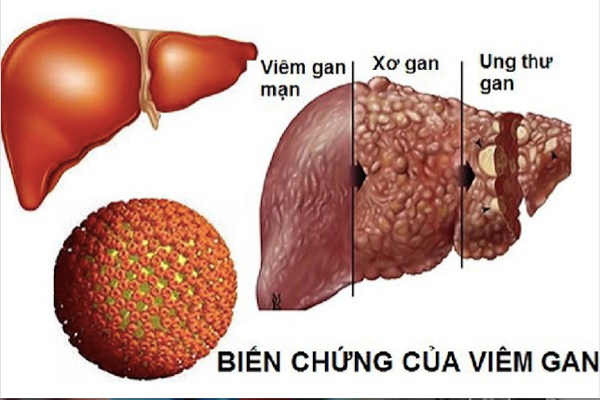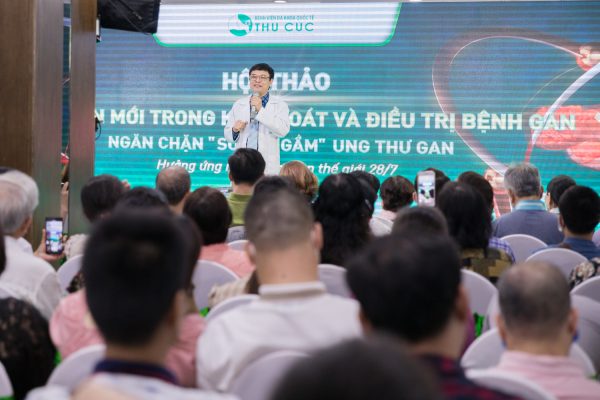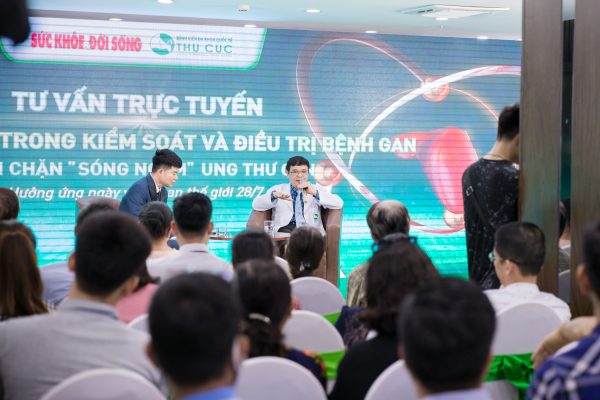The seminar “Revolution in the Diagnosis and Treatment of Liver Diseases” was held on July 23, 2020, in response to World Hepatitis Day recognized annually on July 28. The event highlighted remarkable advances in the treatment of chronic hepatitis B infection.
Host of the conference – Dr. Thanh Xuan Nguyen – a reputable hepatologist with more than 40 years in the field, shared the ongoing situation of liver diseases in Vietnam, as well as introduced a specific regimen that successfully created antibodies that helps cure hepatitis B virus infection.

Viêm gan B mạn tính rất dễ dẫn đến xơ gan và ung thư gan. 80% ca ung thư gan ở Việt Nam có nhiễm virus viêm gan B.
1. The increasing rate of Hepatitis B infection and liver cancer in Vietnam
Up to 20% of the Vietnamese population was living with chronic hepatitis B infection in 2018. A chronic hepatitis B infection can go undetected for years in many cases. Being diagnosed with acute hepatitis B can be difficult, especially in the early stages. If you have hepatitis B, you have an increased risk of liver cancer because these diseases often lead to cirrhosis. Approximately 80% of liver cancers are etiologically associated with hepatitis B virus infection, which is endemic in Vietnam. Liver cancer is responsible for the highest incidence rate in Vietnam, and this rate is gradually increasing. Vietnam also ranks 4th in liver cancer fatality rate among the highest rates in the world. Liver cirrhosis is a silent killer as it often appears without symptoms and is frequently misdiagnosed. Patients with liver cancer survive their cancer only for a few years depending on which stage they are diagnosed with. The World Health Organization (WHO) 2018 reported that 25,335 people in Vietnam contracted liver cancer in 2018, accounting for 15.4% of the total number of new cases diagnosed, being the most common cancer in Vietnam. Notably, this number of cases was only 9,400 people in 2010 and 5,700 people in 2000. The WHO 2018 report also showed an estimated 25,404 deaths a year, approximately three times higher than deaths from traffic deaths.

Dr. Thanh has deep expertise and experience in treating Hepatitis virus infection. He emphasized, “The remedy of hepatitis comes with three factors: weapon, army, and facility. The medication is the weapon as it helps the body fight off harmful viruses. The army is the immune system as it stimulates and modulates antibodies to fight against viruses.
At TCI, we simultaneously manage three tasks: virus prevention, immune system boosting, and cell protection, to build a strong army to fight against hepatitis viruses.
2. Advances in the treatment and prevention of liver cancer
The seminar aimed to raise awareness of the global burden of viral hepatitis and to influence real change, calling on people to take action.
Patients who fully recovered from the infection by following Dr. Thanh’s course of treatment came and shared their stories and experiences dealing with Hepatitis viruses. It was living proof that early disease detection and acute regimen are essential for a successful treatment. Many patients have applied this specific regimen at TCI and received the expected results.

TCI Hospital is well known for the treatment of many liver diseases thanks to:
- An attentive and professional medical team, including:
- Prof. Dr. Thanh Xuan Nguyen: with over 40 years of experience as a hepatologist. He earned a degree in Doctor of Medicine at Shimane University in Japan. He is also a member of the Hepatobiliary Society and Japan Ultrasound Society, and former director of the Military Institute for Disease Prevention and Control.
- Dr. Tuan Quang Nguyen: with over 40 years of specializing in internal medicine and hepatobiliary. He is the former head of the Infectious Diseases Department of Bach Mai Hospital.
- Dr. Mau Quang Ta: Director of TCI and former head of the Tropical Diseases Department at Ha Dong Hospital
- Dr. Khue Van Nguyen: former head of the Hospital Examination Department at 108 Hospital.
- State-of-the-art medical equipment: TCI constantly updates new medical technologies and methods, always at the forefront of treatment advances.
- Liver ultrasound elastography: non-invasive assessment of liver fibrosis; an effective method to yield qualitative and quantitative information used for diagnostic purposes.
- MRI scan: preferred over CT scans because MRI scans have no radiation exposure. An MRI provides details of whether there is cancer in your liver, and if so, where it is.
- Multi-slice computed tomography MSCT: provides sharp, detailed images that can’t be achieved with other tests.
Besides, TCI implements multiple ways to financially support patients such as reasonable fees, medical insurance payment, and guarantee insurance applications. TCI is ranked in the top 5 hospitals with leading quality scores and in the top 3 private hospitals with 99% for patient satisfaction according to the survey of the Hanoi Department of Health.








